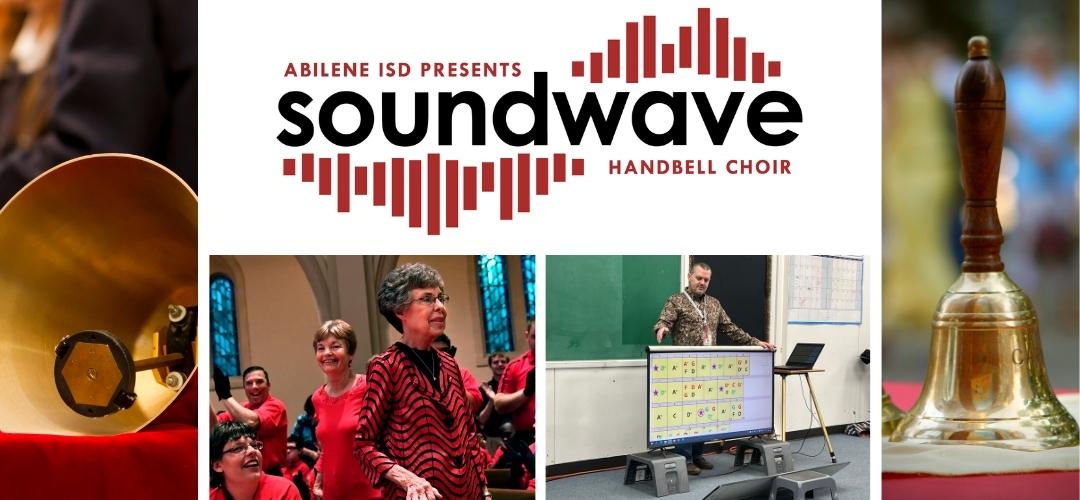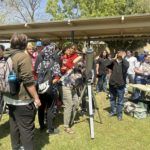It was September 1978 when Letha McGrew walked into a music classroom at the Woodson Skills Center, stood before a group of special needs children, and wondered what in the world she was doing.
The former music teacher at then-Johnston Elementary School had taken a few years off while her boys, Scott and Stacey, were younger. However, when she was ready to return to work, AISD Director of Fine Arts Bob Siltman proposed a different type of music class that would focus on special needs students in the district.
McGrew then formed what would become known as the Woodson Handbell Choir, and over the years, they played all over the city, state, and country, representing Abilene and the AISD. McGrew even took the choir to the White House to perform in 1991 – all of that from the mind of a beloved music teacher with no formal training in special education.
“It was sort of an accident when I started on this,” McGrew said. “I didn’t know what I was doing, so it just kind of evolved. I firmly believe that sometimes God sends us places we don’t necessarily want to go. I didn’t have any background in special education, and the first day I went over to Woodson, I wondered what I had gotten myself into. But there were teachers who helped me along, and I appreciate them. And … music speaks to everyone, no matter who you are.”
After McGrew retired, Cathy Taylor, who met the original director at a concert in San Angelo, took over as the director, and the group was re-branded as Abilene Gold. After Taylor retired following the 2014-15 school year, current director Eric Logan was hired and he’s now completing his eighth year leading the group that is now called Soundwave.
Logan is also putting together a 45th-anniversary celebration concert scheduled for April 25 at 7 p.m. at First Baptist Church. All former ringers in the Woodson Handbell Choir, Abilene Gold, or Soundwave are welcome to attend and join in playing some songs as an alumni choir.
“We had a 40th-anniversary celebration, and the alumni choir was well-attended, so we’re looking forward to seeing this group for the 45th anniversary,” Logan said. “We had people in their 50s showing up to ring with us. When we go out into the community, no matter where it is, there are always people there who used to be in the choir, and they come up to us and talk and share their stories about being in the choir.”
McGrew got her idea for how the students would read music from a group of special needs adults who had played handbells at First Christian Church, using simple tunes written on a scroll. From that idea, her system of adaptive notation was born. She began by transferring standard notation to a method of letters, colors, and symbols that she would then point to, directing the person with the bell corresponding to the note to play.
If it sounds simple, it wasn’t. McGrew would face the choir and read the scroll upside down, pointing at the notes from right to left so that her students could read it left to right. And she was also pushing the scroll down with her left hand, which meant the beginning of every song was at the bottom of the scroll. The entire thing for the director was backward and upside down.
But it worked.
Logan used the scrolls for the first couple of years he directed the choir but has spent the last several years putting them into an Excel format that he uses. That is projected onto a TV screen that he uses at concerts. And instead of looking at everything upside down and right to left, he has a mirror in front of the TV screen that projects a correct image to him so he can direct more efficiently. And since he has the music on a computer, he can use a hand-held mouse to scroll through the music.
“The music scores became increasingly challenging through the years, requiring longer and longer scrolls,” McGrew said. “Eric solved the problem we always had by putting everything on a computer and a TV screen, which is much more up to date.”
Like McGrew, Logan had no background in special education when he was hired to take over the handbell choir. He worked in a church and had worked with children’s handbell choirs at church, but never in a school setting. He met with Taylor for about 90 minutes one Friday afternoon in August 2015, and then school started the following Tuesday, thrusting him feet-first into the deep end of special education music.
“I had a little bit of a grip on what I was doing, but I hadn’t done it,” Logan said. “I was so blessed that year that the advanced choir was full of veterans, and they taught me as much as I taught them that year. I find that my high school students in special education allow me to be just as funny and silly as I need to be for us to only have a great time but to get my point across. It’s been particularly beneficial to my directing style that they feed off my nature. I tell people all the time that they’ll have to pull this program from my cold, dead fingers.”
That type of love for the choir and students and what they do has been passed down from McGrew to Taylor to Logan, and it’s evident whenever Soundwave takes the stage.
“Some days are challenging, but my students work very hard to accomplish what they accomplish,” Logan said. “They have no grasp of what they’re actually accomplishing. Being able to do this every day instead of once or twice a week allows them to not only be involved in music – which is so mentally and socially beneficial – but also retain the information daily and really nail it down.”
And the rewards of teaching those students far outweigh the challenges, something that all three directors know firsthand.
“This program was started 45 years ago to give special needs students the opportunity to experience the joy of making music … not just hearing it or watching others perform but participating in the thrill of being part of a music group,” McGrew said.
“I feel a little bit like a grandmother to the group. I can brag on them and not have any responsibilities,” she said with a laugh. “There have always been so many positive outcomes associated with the handbell choir: self-esteem, learning behavior and self-control, the opportunity to perform, development of skill and musicianship, creation of special memories, and giving other students and audiences a new perspective on the abilities of special needs students.
“I find it amazing, thrilling, and gratifying that the bell choir continues in existence after 45 years,” McGrew said, “giving present and future students the joy of participating in a music group.”













